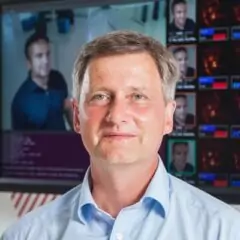Feynman Prizes
The Feynman Prizes, named in honor of physicist Richard Feynman, recognize exceptional contributions to nanotechnology.
Richard Feynman’s 1959 lecture, “There’s Plenty of Room at the Bottom“, is widely credited as inspiring the field of nanotechnology. Theses Prizes celebrate his groundbreaking vision for science, by recognizing exceptional contributions that advance nanotechnology.
Prizes for Future Nobel Laureates
The Feynman Prizes have a track record of recognizing important work early. Previous winners include two Nobel Laureates – David Baker who won the Feynman Prize in 2004 and the Nobel Prize in Chemistry 2024, and Sir Fraser Stoddart who won the 2007 Feynman Prize, and the 2016 Nobel Prize in Chemistry.
Three categories – Theory, Experiment & Student
We award the Feynman Prizes annually in three categories – Theory, Experiment and Distinguished Student Award. There is also the Grand Prize – yet to be claimed – for the first team who designs, constructs, and demonstrates a functional nano-scale robotic arm, and a functional nano-scale computing device.
Critieria
Theory Prize ($5,000)
The Feynman Prize for Theory is awarded for excellence in theory to the researchers whose recent work has most advanced the achievement of Feynman’s goal for nanotechnology: molecular manufacturing, defined as the construction of atomically-precise products through the use of molecular machine systems. The prize entails $5,000, an invitation to the award ceremony and technical workshop, and public acknowledgment and support.
Experiment Prize ($5,000)
The Feynman Prize for Experiment is awarded for excellence in experimentation to the researchers whose recent work has most advanced the achievement of Feynman’s goal for nanotechnology: molecular manufacturing, defined as the construction of atomically-precise products through the use of molecular machine systems. The prize entails $5,000, an invitation to the award ceremony and technical workshop, and public acknowledgment and support.
Student Prize ($1,000)
The Distinguished Student Award recognizes the College graduate or undergraduate student whose work is considered most notable in advancing the development and understanding of nanotechnology. The prize entails $1,000, an invitation to the award ceremony and technical workshop, and public acknowledgment and support.
Grand Prize ($250,000)
The Feynman Grand Prize will be awarded to the first team who designs, constructs, and demonstrates both a functional nano-scale robotic arm and a functional nano-scale computing device with specified features. Established in 1996 by by two entrepreneurs associated with Foresight Institute; James R. Von Ehr II (former Founder of Altsys Corporation, former Vice President at Macromedia, and current CEO and Founder of Zyvex Labs and Board of Zyvex Technologies) and Marc Arnold (CEO of Angel Technologies, a St. Louis-based wireless telecommunication company) the Feynman Grand Prize worth $250,000 is yet to be claimed.
…the rewards awaiting those who achieve significant nanotechnology breakthroughs will be far greater than the prize itself.
2024 Winners
The 2024 Feynman Prizes were awarded to Prof Dr Klaus-Robert Müller (Theory), Prof Dr Saw Wai Hla (Experiment), and Gabriella Gagliano (Student).

Prof Dr Klaus-Robert Müller

Prof Dr Saw Wai Hla

Gabriella Gagliano
Previous Winners
2023
- Alexandre Tkatchenko
- James J. Collins
- Qiancheng Xiong
2022
- James R. Chelikowsky
- Sergei V. Kalinin
- Dr. Emanuele Penocchio
2021
- Kendall N. Houk
- Anne-Sophie Duwez
- Yuanning Feng
2020
- Prof. Massimiliano Di Ventra
- Prof. Hao Yan
- Dr. Liang Feng
2019
- Prof. Giulia Galli
- Lulu Qian
- Yuxing Yao
2018
- Prof. Anatole von Lilienfeld
- Andreas Heinrich
- Christopher Lutz
- Qi Li
2017
- Giovanni Zoccchi
- William Shih
- Hai Qian
2016
- Bartosz A. Grzybowski
- Franz J. Giessibl
- Conrad Pfeiffer
2015
- Markus J. Buehler
- Michelle Y. Simmons FAA
- Chuyang Cheng
2014
- Amanda S. Barnard
- Joseph W. Lyding
2013
- David N. Beratan
- Alexander K. Zettl
- Jonathan C. Barnes
2012
- David Soloveichik
- Gerhard Meyer
- Leo Gross
- Jascha Repp
- David Walker
2011
- Raymond Astumian
- Leonhard Grill
2010
- Gustavo E. Scuseria
- Masakazu Aono
2009
- Robert A. Freitas Jr.
- Yoshiaki Sugimoto
- Masayuki Abe
- Oscar Custance
2008
- George C. Schatz
- James M. Tour
2007
- David A Leigh
- J. Fraser Stoddart
- Fung Suong Ou
- Robert A. Freitas Jr.
2006
- Erik Winfree
- Paul W.K. Rothemund
- Berhane Temelso
- John Storrs Hall
2005
- Christian Joachim
- Christian Schafmeister
- Christopher Levins
- Rocky Rawstern
- Congressman Mike Honda
2004
- David Baker
- Brian Kuhlman
- Homme Hellinga
- Damian Allis
- Howard Lovy
2003
- Marvin L. Cohen
- Steven G. Louie
- Carlo Montemagno
- Ahmet Yildiz
- Tim Harper
- Paul Holister
2002
- Don Brenner
- Chad Mirkin
- Yi Cui
- David Pescovitz
2001
- Mark A. Ratner
- Charles M. Lieber
- Jing Kong
- Ivan Amato
2000
- Uzi Landman
- R. Stanley Williams
- Philip Kuekes
- James Heath
- Christopher Love
- Ron Dagani
1999
- William A. Goddard III
- Dr. Tahir Cagin
- Ms. Yue Qi
- Phaedon Avouris
- Anita Goel
1998
- Ralph C. Merkle
- Stephen Walch
- M. Reza Ghadiri
- Fotis Nifiatis
1997
- Charles Bauschlicher
- Stephen Barnard
- Creon Levit
- Glenn Deardorff
- Al Globus
- Jie Han
- Richard Jaffe
- Alessandra Ricca
- Marzio Rosi
- Deepak Srivastava
- H. Thuemmel
- James K. Gimzewski
- Reto Schlittler
- Christian Joachim
- Phil Collins
1995
- Nadrian C. Seeman
1993
- Charles Musgrave